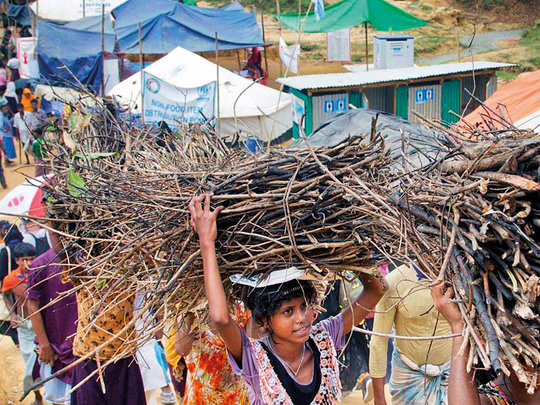
MANILA: Southeast Asian leaders kept silent over accusations of ethnic cleansing carried out by Myanmar’s army in a statement Thursday, instead expressing support for the country’s efforts to bring peace and harmony to northern Rakhine state.
More than 600,000 Muslim Rohingya have fled mainly Buddhist Myanmar since a military crackdown was launched in Rakhine in August, which the United Nations and watchdogs have said amounts to ethnic cleansing.
Rights groups had urged the 10-member Association of Southeast Asian Nations (ASEAN) to take a strong stand on the crisis in its summit in Manila this week.
But a statement released by the bloc after the meeting failed to condemn the atrocities and merely said an unspecified number of leaders backed Myanmar’s humanitarian relief programme in Rakhine.
“They expressed support to the Myanmar Government in its efforts to bring peace, stability, rule of law and to promote harmony and reconciliation between the various communities,” it said.
Myanmar authorities insist the military campaign was aimed at rooting out Rohingya militants who attacked police posts on August 25.
But the UN and rights groups have documented civilian accounts of murder, rape and arson at the hands of the army.
The ASEAN statement was issued hours after watchdogs released reports on “widespread and systematic attacks” on Rohingya civilians including troops gang-raping women and girls.
Rohingya refugees cannot return to Rakhine state until “real Myanmar citizens” are ready to accept them, the country’s army chief said Thursday, casting doubt over government pledges to begin repatriating the persecuted Muslim minority.
More than 600,000 Rohingya are languishing in Bangladeshi refugee camps after fleeing a brutal Myanmar army campaign launched in late August.
The UN says the scorched-earth operation, which has left hundreds of villages burnt to ash in northern Rakhine state, amounts to ethnic cleansing of the stateless minority.
But Myanmar’s hardline army chief Min Aung Hlaing has steadfastly denied all allegations of abuse, insisting troops only targeted Rohingya insurgents.
He has also taken to Facebook throughout the crisis to fan anti-Rohingya sentiment among the Buddhist public, branding the Muslims as foreign interlopers from Bangladesh despite many having lived in Rakhine for generations.
On Thursday he signalled repatriation of the Rohingya was a long way off, saying their return must first be accepted by ethnic Rakhine Buddhists — many of whom loathe the Muslim minority and are accused of aiding soldiers in torching their homes.
“Emphasis must be placed on wish of local Rakhine ethnic people who are real Myanmar citizens. Only when local Rakhine ethnic people accept it, will all the people satisfy it (sic),” the statement, written in English, said on his Facebook page.
The army commander also said Myanmar would not allow the return of all Rohingya in Bangladesh, a country that was already hosting hundreds of thousands of the minority from previous waves of persecution.
“It is impossible to accept the number of persons proposed by Bangladesh,” the army statement said, after branding the refugees as “terrorists” who fled with their families.
The general’s comments came a day after he met with US Secretary of State Rex Tillerson, who on Wednesday called on the army to support efforts to return “all refugees”, adding that the reports of widespread atrocities by Myanmar’s soldiers were “credible”.
Bangladesh and Myanmar have agreed in principle to begin repatriation but are still tussling over the details.
Questions are mounting over how many Rohingya will be allowed to return, where they will live after they homes have been burnt down and how they will coexist peacefully among ethnic Rakhine neighbours.
Tensions between the two groups have simmered for years, erupting into bouts of bloodshed in 2012 that pushed more than 100,000 Rohingya into grim displacement camps.
The Muslim minority has for years suffered under discrimination from a government that denies them citizenship and severely restricts their access to work, health care and education.
Myanmar’s de facto civilian leader Aung San Suu Kyi attended the ASEAN summit where the UN chief and US Secretary of State Rex Tillerson met with her on the Rohingya crisis.
The bloc has a principle of non-interference in the internal affairs of members despite criticism over the years that it is little more than a talking shop.
Ironically Suu Kyi was one of those who once criticised ASEAN for its quiescence on regional rights abuses, when she was peacefully confronting years of junta rule.
In a July 1999 article for Thai daily The Nation, Suu Kyi called on ASEAN to harden its stance towards the junta in Yangon, saying the group did not have a “clear conscience” over human rights.
“This policy of non-interference is just an excuse for not helping. In this day and age you cannot avoid interference in the matters of other countries,” she wrote.
ASEAN groups Myanmar, Brunei, Cambodia, Laos, Philippines, Singapore, Thailand, Vietnam as well as Muslim-majority Indonesia and Malaysia, where there have been protests on the treatment of the Rohingya.
Thursday’s ASEAN statement stressed the importance of increasing humanitarian access to Rakhine and helping affected communities.
The leaders also urged Myanmar to implement the recommendations of a commission led by former UN chief Kofi Annan to scrap restrictions on movement and citizenship for the Rohingya.
The statement did not use the word “Rohingya” to refer to the persecuted Muslim minority, an incendiary term for Buddhist nationalists who label the group “Bengalis”.
Amnesty International has said the bloc’s response to the Rohingya crisis has been “toothless at best”.












